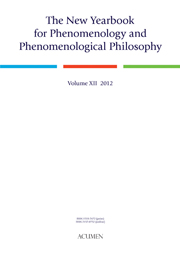Book contents
- Frontmatter
- Contents
- Articles
- Documents
- In Review
- Making Sense of Husserl's Early Writings on Mathematics: Stefania Centrone, Logic and Philosophy of Mathematics in the Early Husserl
- Commentary on Some Themes in Stefania Centrone's Logic and Philosophy of Mathematics in the Early Husserl
- Mathematical Existence, Mathematical Fictions, Etiological Proofs and Other Matters: Replies to Mirja Hartimo and Robert Tragesser
- Stefania Centrone, Logic and Philosophy of Mathematics in the Early Husserl
- Reply to Mark van Atten: on Husserl-Computable Functions
Mathematical Existence, Mathematical Fictions, Etiological Proofs and Other Matters: Replies to Mirja Hartimo and Robert Tragesser
from In Review
- Frontmatter
- Contents
- Articles
- Documents
- In Review
- Making Sense of Husserl's Early Writings on Mathematics: Stefania Centrone, Logic and Philosophy of Mathematics in the Early Husserl
- Commentary on Some Themes in Stefania Centrone's Logic and Philosophy of Mathematics in the Early Husserl
- Mathematical Existence, Mathematical Fictions, Etiological Proofs and Other Matters: Replies to Mirja Hartimo and Robert Tragesser
- Stefania Centrone, Logic and Philosophy of Mathematics in the Early Husserl
- Reply to Mark van Atten: on Husserl-Computable Functions
Summary
Abstract: This paper provides answers to some remarks that Mirja Hartimo and Robert Tragesser have made on a number of themes dealt with in my book Logic and Philosophy of Mathematics in the Early Husserl. In the first part (replies to Mirja Hartimo) I focus on the much debated problem of the influences behind Husserl's turn away from his earlier psychologistic positions, and consider in particular the role of Frege and Bolzano in determining Husserl's objectivist turn. In the second part (replies to Robert Tragesser) I discuss Husserl's concept of a universal arithmetic and answer some questions raised by Tragesser on my critical explanation of Husserl's idea that a field of objects can be said to exist, if it is possible to set up an axiomatic existential framework for it. I finally spell out a parallel between Husserl's existential axiomatics and Kit Fine's method of procedural postulationism, trying to bring some evidence for my claims.
Keywords: Edmund Husserl; Robert Tragesser; Mirja Hartimo; philosophy of mathematics; philosophy of logic
“The Intentions behind the Ideas”: On the Question of the Influences behind Husserl's Refutation of Psychologism in the Prolegomena to Pure Logic
“Husserl's idea of pure logic,” according to Mirja Hartimo, “is the cornerstone of his arguments against psychologism (in the Prolegomena to Pure Logic)” Previously she observed that “[m]uch of the secondary literature on Husserl has been devoted to the question of possible influences behind Husserl's rather radical arguments against psychologism in the Prolegomena” and rightly stressed that “one cannot intelligibly address these influences without examining the development of Husserl's conception of logic and mathematics.”
- Type
- Chapter
- Information
- Publisher: Acumen PublishingPrint publication year: 2013



